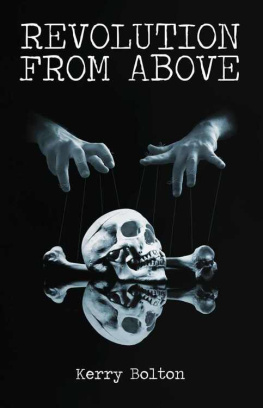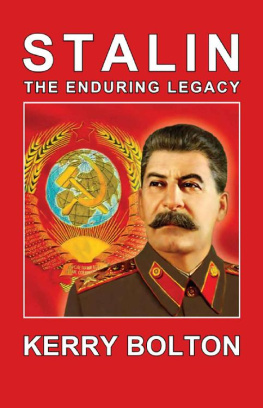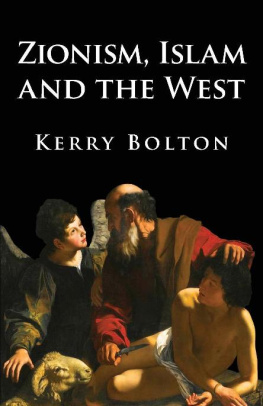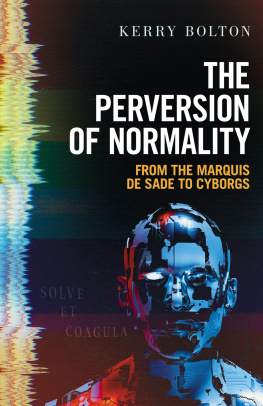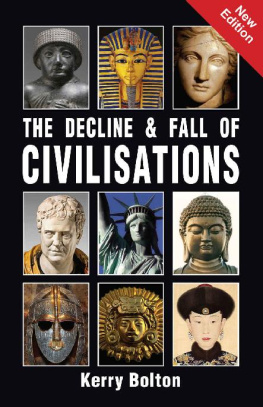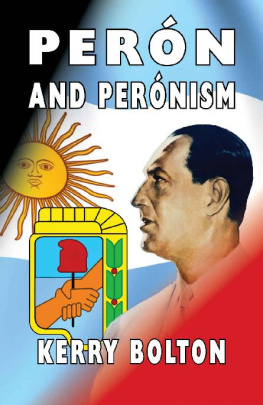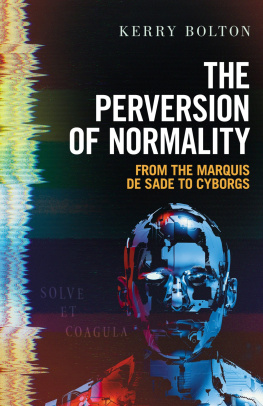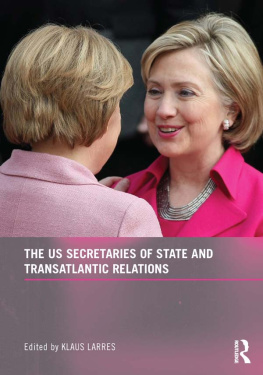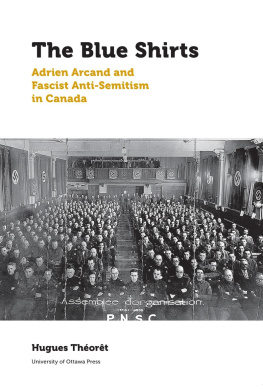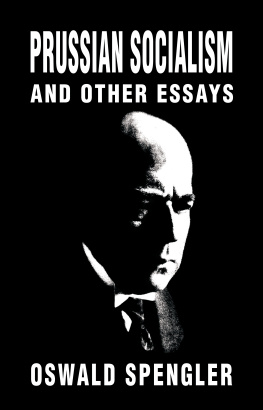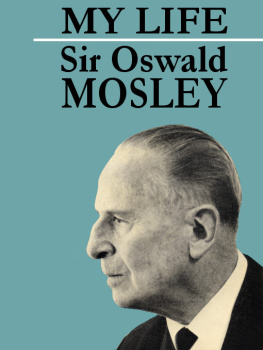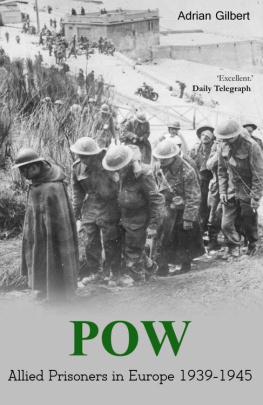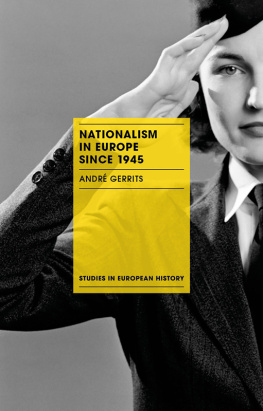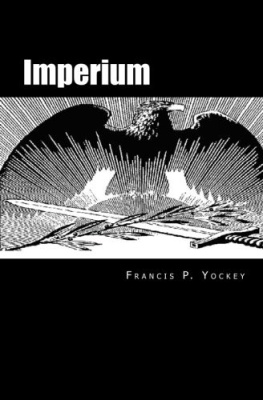Arktos
London 2018
Copyright 2018 by Arktos Media Ltd.
All rights reserved. No part of this book may be reproduced or utilised in any form or by any means (whether electronic or mechanical), including photocopying, recording or by any information storage and retrieval system, without permission in writing from the publisher.
Arktos.com | Facebook | Twitter | Instagram
ISBN
978-1-912079-15-5 (Paperback)
978-1-912079-12-4 (Hardback)
978-1-912079-14-8 (Ebook)
Editing
Sam Richardson
John Bruce Leonard
Charles Lyons
Cover and Layout
Tor Westman
Foreword
by Dr Tomislav Sunic
A n experienced reader can tell a well-written scholarly book by first checking the authors style and then the size and the quality of his footnotes. There is no lack of either in Kerry Boltons prose; neither in the books bibliographic substance, nor in Boltons very readable style. This is the first time an exhaustive work on the prominent Euro-American fascist activist and philosopher, Francis Parker Yockey, is being offered to a wider readership in the English-speaking world. Naturally, for a starter, a big question that comes to mind immediately is: Whats the point of reading Boltons thick book and how relevant is Yockeys anti-communism and anti-liberalism in dealing with the ongoing decay of the multicultural West, which is currently subject to an open invasion of non-European masses? Since Bolton often uses the German word Zeitgeist in his description of the dominant political ideas of Yockeys times, a neophyte might likewise wonder if and how Yockeys political prognoses are being validated by the dominant political ideas of our time. For many nationalist old-timers, both in Europe and America, Yockey is a household name that is indispensable in studying the intellectual developments of cultural fascism. Yet for many young identitarians today, regardless of whether they identify as alt-right, new right or traditionalist, the name Yockey, along with his magnum opus Imperium, may sound a bit outdated. Several years ago, when Bolton started writing this book, he was aware that Yockey, with all his literary baggage and worldwide acquaintances, would today become more timely than ever before. The successors to Yockeys Bolshevik arch-enemies have replaced their erstwhile iconography of the cosmopolitan and borderless proletariat with a new liberal imagery of mixed-raced and stateless pederasts accompanied by masses of non-European migrants. Yockeys enemies are alive and thriving, irrespective of their change in ideological color.
As far as the composition of the book is concerned, Bolton provides a wide historical-literary framework in which Yockey serves as a springboard, or better yet as a major sidekick, for a better understanding of similar and like-minded authors and political protagonists of his times. In the following pages, Bolton first goes into the clarification of political concepts and their semantic distortions that have been orchestrated by the victorious communist and liberal elites over the past 70 years. While using Yockey as a guide, Bolton sheds additional light on the values of the modern system that keeps rewriting the intellectual history of the West as it best fits its mercantile and rootless agenda. A System that once produced Shakespeare but now produces sitcom scriptwriters; that once birthed Beethoven and Mozart but now lauds Lady Gaga. This process of cultural degeneration did not, however, start with Lady Gaga or the recent welcoming calls to millions of non-White migrants. It has its roots in the eighteenth century Enlightenment and its political offshoots in America and France. The secular religion of human rights subsequently gave birth to communism and then to its modern ersatz, multiculturalism. The following chapters also explain how the reception of Yockeys work varied among different European and American identitarians, with some calling Yockey anti-American and others praising him to the heavens.
Yockeys own criticism of Americanism and the money-based Puritan culture of WASP America, where Jews ... could buy their influence must have played a role after the Second World War in his registering on the FBIs radar. His critical remarks about the American Jews and their role in the media, the combination of which we call today in a coded language fake news, earned him a great deal of intellectual respect among prominent European nationalist scholars who had traditionally looked down upon America as a stray-away and uncultured Jew-run entity. Yockeys openly pro-German stance, especially when serving as a young attorney at the Wiesbaden show trials in 1946, must have been seen as an additional irritating detail for the American ruling class and several Jews on the bench. His openly pro-European, anti-communist and anti-liberal attitudes may be compared today with the views of some segments of the American alt-right, who are walking in Yockeys footsteps unawares, realizing that petty nationalist inter-White squabbles, tribal infighting amidst traditionalists, racialists, right-wing Catholics, Protestants and pagans, are outdated and need to go away.
One name that repeatedly springs up in Boltons pages is Oswald Spengler. Indeed, the whole of Yockeys work must be seen as a sequel to Spenglers The Decline of the West, where he radically rejects the money-obsessed capitalist West and its beacon, America. It is to the merit of Bolton that he does not just drop the names of dozens of American and European authors, scholars and activists, some of whom were close friends and acquaintances of Yockey, but instead tries to explain the context or background behind each person, organization and political concept under consideration. This is important insofar as Boltons reader will come across numerous terms like ethical socialism or Prussian socialism, with which Yockey is often associated, and whose historical meaning needs to be further explained to younger readers. Boltons pages are literally teeming with quotes and citations, particularly in the realm of modern historiography and legal studies, especially in the chapters where Bolton examines the myth of the so-called freedom-loving West. The post-Second World War mass shootings of thousands of German POWs and mass rapes of German women were not just part of a well-recorded folklore among Soviet soldiers in vanquished Germany but also a customary, albeit well-hidden, escapade of many British and American soldiers showing the extent of the torture regime against Germans after the war. Nowadays, we may all fake concern for victims of mass purges and communist killing fields in Eastern Europe in late 1945. However, one does not need to speculate much about those who served as role models to East European communists. After the Second World War, communist prosecutors and henchmen in Eastern Europe were only copying in a more brutal way the techniques of their former war allies. Well, the chickens have finally come home to roost. The new Brusselsguided liberal governance in Eastern Europe is largely staffed by former communist apparatchiks, or to put it more precisely, by the rebranded progeny of former communist cut-throatswith the full blessing of the free West.
Yockey was a multilayered and multifarious character bursting with intellectual curiosity, which is highlighted in Boltons subsequent descriptions dealing with Yockeys numerous peregrinations across Europe and his contacts with prominent post-fascist literati and aspiring nationalist leadersat least those who had managed to evade the Allied rope. Ironically, the Western and American liberal world-improvers, at the beginning of the Cold War, were willy-nilly obliged to later tap into the expertise of their former foes. Yockey, as Bolton chronicles, was on good terms with numerous post-fascist figureheadssuch as Giorgio Almirante, once a high-ranking politician in the late Mussolini government, who at the beginning of the Cold War played an important role in regrouping Italian nationalists. Yockey also nurtured ties with Sir Oswald Mosley, the former leader of the British Union of Fascists, as well as with the short-lived post-Second World War political party, the Socialist Reich Party of Germany, which had regrouped a large number of former National-Socialist members and former SS officers. Again, we need to revisit the famed notion of the Zeitgeist , the spirit of the time, which when Yockey was alive was very diffuse and liquid on all fronts: on the one hand staged trials and constant surveillance of former Nazi killers were running full steam in the Eastern and Western jurisprudence; on the other, the Western occupying forces, headed by the American world-improvers, were getting ready for a full-scale military conflict against their former ally, the communist Soviet Union. Hence, the reason they needed to rely on the expertise of their former fascist foes. It is often forgotten that at the start of the Cold War, the occupying American authorities in Germany were reliant upon former German SS operatives, just as the build-up of the early Bundeswehr would have been nearly impossible without the prior consent of some former Wehrmacht officers. One may raise an additional philosophical question, which certainly crossed Yockeys mind when he had landed in prison in 1960: What would have happened if the Soviets and the Americans had entered into the military conflict by the early 1950s? It is not hard to guess that Yockey himself would have played an additional historical role in America and Europe, and that his book Imperium would have likely shaped a new form of the Zeitgeist in students curricula.
Next page

